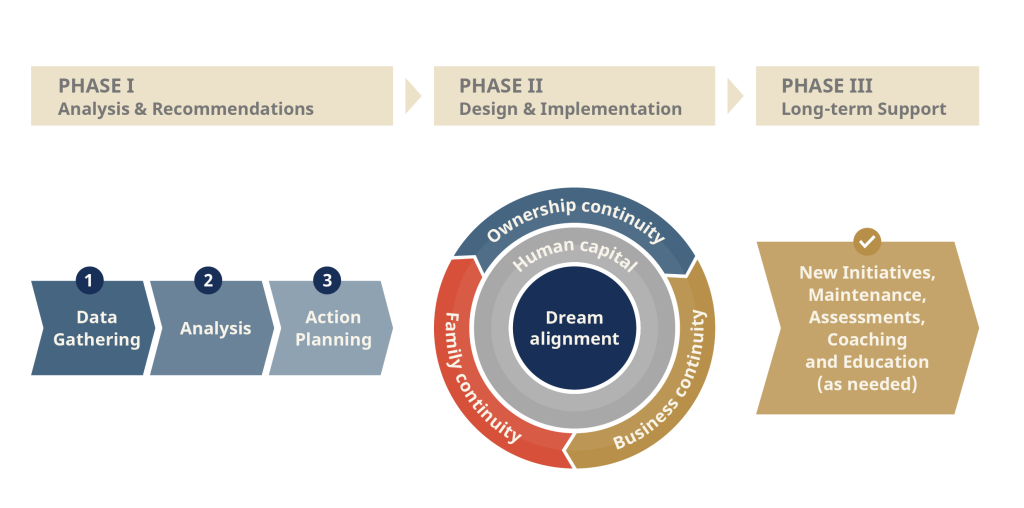
Continuity Audit
A comprehensive action plan to support the long-term success of your family enterprise
Over the last two decades, family enterprise leaders who oversee large, complex portfolios of activity have become more aware of the inherent challenges of continuity planning. We see families investing heavily in developing protocols and agreements, hoping these mechanisms alone will ensure continuity. However, in many cases, the process is derailed because families seek surgical solutions for specific events — like major transactions, leadership transitions, or unexpected crises — rather than planning proactively and holistically for longer-term change.
To define where you want to go, we first need to understand where you are.
At LGA, we strongly support the development of formal agreements and financial planning, but in our experience, policies and processes are just two of the critical drivers of successful continuity.
The LGA Continuity Audit is our signature diagnostic tool. It enables us to gather the full range of data needed to provide you with a comprehensive snapshot of your current situation and develop a customized roadmap to guide your continuity planning.
A transformational experience designed by leading experts in the field.
The Continuity Audit is conducted by an LGA advisory team in collaboration with a steering committee from your family.
It begins with a systems-level analysis of the critical drivers of success across the business, ownership, and family.
We gather this data through in-depth interviews and surveys with all key stakeholders, as well as a comprehensive review of your strategic plans, financial performance, legal and organizational design, governance architecture, leadership teams, estate plans, shared philanthropy and investments, and family demographics and dynamics.
This information is then reviewed by your advisory team and used to develop concrete recommendations and an action plan to support your long-term continuity.

Our analysis is centered around the seven critical drivers of family enterprise continuity, helping the family generate answers to the following key questions:
- Does your family fully understand the fundamental issues and the challenges of family enterprise continuity?
- Do you understand the conditions necessary for success?
- Do you understand where you are in your continuity journey?
- Are your fundamental priorities and purpose clear and shared?
- Do your strategies for wealth creation, wealth preservation, and wealth utilization align around this purpose?
- Do your individual and collective actions align around this purpose?
- Are you aligned as a family about what you want and where you are heading?
- What are your plans for the future, and what else do you need to get there?
- How can your family become better positioned to cope with the strategic challenges that lie ahead?
- How do you organize yourselves to accomplish your shared vision?
- What governance architecture would be most effective given your unique organizational and familial structure and culture?
- How can you coordinate and collaborate more effectively as owners?
- How do you enhance trust?
- How do you strengthen your ability to communicate?
- How do you fit the right people into the right roles?
- Do you agree on the ground rules for dealing with each other as owners?
- How can the rules regulating your family’s relationship with the enterprise be improved?
- What kind of leadership do you need to move the family enterprise forward — both today and into the future?
- How can you develop effective leaders and a culture of shared leadership?
- How can you successfully plan for the transition of power and authority?
Strategies and support to enable
multi-generational success.
You will emerge from the Continuity Audit with a detailed understanding of the key drivers of success in your family enterprise as well as a detailed plan for the future — a roadmap to continuity helping you:
- Navigate critical ownership discussions so current and future owners can articulate their individual aspirations and align around shared values, purpose and vision.
- Launch or upgrade key governance structures, ownership policies, succession plans, and decision-making frameworks.
- Build targeted training and development opportunities for family leaders where they need it most.
We typically share our feedback and roadmap with all key stakeholders in your system in a series of sessions, gathering their input and recruiting buy-in with the recommendations. Once the family is aligned around an action plan, your LGA advisors will be available to support you with any implementation as needed.
Want to learn more about the LGA Continuity Audit?
Case Studies
Each family is unique and all families are alike. Learn how LGA helps enterprising families like yours.
Case Study: Sustaining Engagement in a Cousins Consortium
Three third-generation Family Directors of a large enterprising family were attending a global conference focused on innovation and growth. Their 90-year old family had deep pride and gratitude for the success and leadership of previous generations. However, there were no family members currently working actively in the business, and the family’s only connection to their vast operations — which spanned eight industries and three continents — was limited to these three members of the Board.

Case Study: Launching a Family Office
The second-generation CEO of a large family enterprise was approached by a strategic investor who made a generous and unsolicited offer for their legacy operating business. The CEO had previously never explored a sale — both because of her strong emotional connection to the company and its employees — two of whom were her kids — and because of its attractive cash flow and growth profile.

Case Study: Beginning the Journey of Continuity
A successful entrepreneurial couple on a long overdue vacation was reflecting on the future. Together, they led a portfolio of operating companies, an investment portfolio, and a donor-advised fund. They also had three healthy adult children, the eldest of whom was about to get married.
Related Insights

Why It Took Me Three Years to Finish HBO’s Succession and What It Teaches Us About How Not to Run a Family Enterprise
I tried to watch the award-winning HBO series on numerous occasions, stopping repeatedly, not because it wasn’t brilliant, but because it was brutal. The cynicism, humiliation, and constant power games felt too extreme. For anyone working closely with multi-generational family enterprises, this world of perpetual chaos and zero-sum power felt not only far removed from our reality, but was also a painful mirror reflecting everything that causes a family enterprise to fail.

LGA Insights – October 2025
In this edition, you’ll find a fresh perspective on the “three circles” from Nate Hamilton, who introduces a powerful metaphor of the Enterprising Family Tree, visualizing how Family, Ownership and Business systems are all inextricably linked.
We also feature the latest insights from Fernanda Jaramillo and Gustavo Carvajal who examine the critical role of the Board Chair in a family enterprise.

LGA Insights – July 2025
As the world embraces the beginning of summer in the Northern Hemisphere, and prepares for winter in the South, LGA extends our deepest gratitude to our clients and partners that allow us to play such a pivotal role supporting the continuity of leading family enterprises around the world.

The Enterprising Family Tree: Nurturing Your Roots for Lasting Growth
Envisioning the family enterprise as a tree allows us to better understand the practical hierarchy at play: the roots represent the foundational family dynamics, the strong trunk embodies the ownership structure, and the expansive canopy symbolizes the diverse business ventures. This visual framework brings new clarity to the dynamic interplay of roles, responsibilities, and priorities across all facets of the family’s enterprise.
